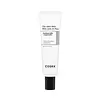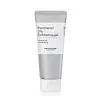What's inside
What's inside
 Key Ingredients
Key Ingredients

 Benefits
Benefits

 Concerns
Concerns

 Ingredients Side-by-side
Ingredients Side-by-side

Water
Skin ConditioningGlycolic Acid
BufferingLactic Acid
BufferingPotassium Hydroxide
BufferingGluconolactone
Skin ConditioningMandelic Acid
AntimicrobialDipropylene Glycol
HumectantPanthenol
Skin ConditioningSalicylic Acid 2%
MaskingMethylpropanediol
Solvent1,2-Hexanediol
Skin ConditioningOctyldodeceth-16
EmulsifyingCitric Acid
BufferingHydroxyethylcellulose
Emulsion StabilisingPentylene Glycol
Skin ConditioningSodium Polyacryloyldimethyl Taurate
Emulsion StabilisingCyanocobalamin
Skin ConditioningPolyacrylate Crosspolymer-6
Emulsion StabilisingHydroxypropyl Starch Phosphate
Ethylhexylglycerin
Skin ConditioningCapryloyl Salicylic Acid
ExfoliatingPolysorbate 60
EmulsifyingDisodium Phosphate
BufferingSodium Phosphate
BufferingTocopherol
AntioxidantAllantoin
Skin ConditioningHydrolyzed Hyaluronic Acid
HumectantWater, Glycolic Acid, Lactic Acid, Potassium Hydroxide, Gluconolactone, Mandelic Acid, Dipropylene Glycol, Panthenol, Salicylic Acid 2%, Methylpropanediol, 1,2-Hexanediol, Octyldodeceth-16, Citric Acid, Hydroxyethylcellulose, Pentylene Glycol, Sodium Polyacryloyldimethyl Taurate, Cyanocobalamin, Polyacrylate Crosspolymer-6, Hydroxypropyl Starch Phosphate, Ethylhexylglycerin, Capryloyl Salicylic Acid, Polysorbate 60, Disodium Phosphate, Sodium Phosphate, Tocopherol, Allantoin, Hydrolyzed Hyaluronic Acid
Water
Skin ConditioningCellulose
Absorbent2,3-Butanediol
Humectant1,2-Hexanediol
Skin ConditioningPanthenol
Skin ConditioningAllantoin
Skin ConditioningVetiveria Zizanoides Root Oil
MaskingRosmarinus Officinalis Leaf Oil
MaskingDipropylene Glycol
HumectantCarnitine
CleansingSerine
MaskingArginine
MaskingCapryloyl Salicylic Acid
ExfoliatingLactobionic Acid
BufferingMandelic Acid
AntimicrobialSalicylic Acid
MaskingCitric Acid
BufferingCarbomer
Emulsion StabilisingHydroxyethylcellulose
Emulsion StabilisingTrisodium EDTA
Tromethamine
BufferingPolyglyceryl-10 Stearate
Skin ConditioningPolyglyceryl-10 Oleate
Skin ConditioningDisodium Phosphate
BufferingSodium Phosphate
BufferingWater, Cellulose, 2,3-Butanediol, 1,2-Hexanediol, Panthenol, Allantoin, Vetiveria Zizanoides Root Oil, Rosmarinus Officinalis Leaf Oil, Dipropylene Glycol, Carnitine, Serine, Arginine, Capryloyl Salicylic Acid, Lactobionic Acid, Mandelic Acid, Salicylic Acid, Citric Acid, Carbomer, Hydroxyethylcellulose, Trisodium EDTA, Tromethamine, Polyglyceryl-10 Stearate, Polyglyceryl-10 Oleate, Disodium Phosphate, Sodium Phosphate
 Reviews
Reviews

Ingredients Explained
These ingredients are found in both products.
Ingredients higher up in an ingredient list are typically present in a larger amount.
1,2-Hexanediol is a synthetic liquid and another multi-functional powerhouse.
It is a:
- Humectant, drawing moisture into the skin
- Emollient, helping to soften skin
- Solvent, dispersing and stabilizing formulas
- Preservative booster, enhancing the antimicrobial activity of other preservatives
Allantoin is a soothing ingredient known for its protective and moisturizingg properties. Because of this, it is often added to products with strong active ingredients.
Studies show higher concentrations of this ingredient can promote wound healing.
Though it can be derived from the comfrey plant, allantoin is produced synthetically for cosmetic products to ensure purity.
Learn more about AllantoinCapryloyl Salicylic Acid comes from salicylic acid, the famous acne-fighting BHA.
It usually goes by a more common name of LHA, or lipohydroxy acid.
Like salicylic acid, this ingredient is a chemical exfoliant that can help break down the oil in your pores and reduce inflammation.
Though studies for LHA do show it to be less effective than salicylic acid. To be fair, salicylic acid is the reigning monarch of acne treatments.
However, a study from 2009 found LHA to be comparable to BPO, making it a good alternative for people with sensitive skin. Another study of 14 patients found a significant decrease in comedones after using LHA.
Another pro of LHA? It is less irritating than salicylic acid due to its large molecule size.
Large molecules cannot penetrate skin as well, so they are gentler on the skin. LHA is much less penetrative than salicylic acid.
An in-vitro study (not done on a living organism) found only 6% of LHA penetrated past the statum corneum compared to 58% of salicylic acid. An in-vivo (done on a living organism) analysis revealed ~17% of LHA was still present in the top layer of skin after 4 days, versus ~9% of salicylic acid.
Interestingly, a study from 2008 found LHA comparable to another famous acid, glycolic acid.
This study found about 10% of LHA is as effective as 20-50% of glycolic acid in treating hyperpigmentation and fine-lines.
Hydroxy acids have been found to stimulate skin protein, lipids, and thermal thickening. This may have anti-aging benefits.
Learn more about Capryloyl Salicylic AcidCitric Acid is an alpha hydroxy acid (AHA) naturally found in citrus fruits like oranges, lemons, and limes.
Like other AHAs, citric acid can exfoliate skin by breaking down the bonds that hold dead skin cells together. This helps reveal smoother and brighter skin underneath.
However, this exfoliating effect only happens at high concentrations (20%) which can be hard to find in cosmetic products.
Due to this, citric acid is usually included in small amounts as a pH adjuster. This helps keep products slightly more acidic and compatible with skin's natural pH.
In skincare formulas, citric acid can:
While it can provide some skin benefits, research shows lactic acid and glycolic acid are generally more effective and less irritating exfoliants.
Most citric acid used in skincare today is made by fermenting sugars (usually from molasses). This synthetic version is identical to the natural citrus form but easier to stabilize and use in formulations.
Read more about some other popular AHA's here:
Learn more about Citric AcidDipropylene Glycol is a synthetically created humectant, stabilizer, and solvent.
This ingredient helps:
Dipropylene glycol is technically an alcohol, but it belongs to the glycol family (often considered part of the ‘good’ alcohols). This means it is hydrating and gentle on skin unlike drying solvent alcohols like denatured alcohol.
As a masking agent, Dipropylene Glycol can be used to cover the smell of other ingredients. However, it does not have a scent.
Studies show Dipropylene Glycol is considered safe to use in skincare.
Learn more about Dipropylene GlycolDisodium Phosphate is a water-soluble powder used as a pH adjuster.
Hydroxyethylcellulose is used to improve the texture of products. It is created from a chemical reaction involving ethylene oxide and alkali-cellulose. Cellulose is a sugar found in plant cell walls and help give plants structure.
This ingredient helps stabilize products by preventing ingredients from separating. It can also help thicken the texture of a product.
This ingredient can also be found in pill medicines to help our bodies digest other ingredients.
Learn more about HydroxyethylcelluloseMandelic Acid is an alpha hydroxy acid (AHA).
Like other AHAs, it helps exfoliate the surface of the skin by breaking down the bonds that hold dead skin cells together. This helps reveal smoother and brighter skin underneath.
Mandelic acid helps with:
Due to it having a larger molecular size than glycolic acid, mandelic acid is able to penetrate the skin more slowly and evenly. This makes it gentler and less irritating, making it a great option for sensitive or beginner skin.
Despite being milder, mandelic acid is still an effective exfoliant that improves skin texture and tone over time.
What makes mandelic acid stand out from other AHAs? It has antibacterial and antioxidant properties.
These traits make it a great option for acne-prone or problem skin by reducing active breakouts and fading post-acne marks. Studies show that mandelic acid (especially when combined with salicylic acid) can significantly reduce pimples and hyperpigmentation while causing fewer side effects than stronger acids.
Mandelic acid is effective in concentrations of 5% and up with an ideal pH range of 3-4 for at-home use.
Like other AHAs, it’s important to wear sunscreen daily to protect your newly exfoliated skin.
However, unlike glycolic acid, mandelic acid is light-sensitive. Be sure your mandelic acid is packaged in opaque containers to ensure it stays stable and effective.
In short, mandelic acid is a gentle yet powerful AHA that exfoliates, brightens, and helps clarify skin while keeping irritation low. Its antibacterial action makes it especially beneficial for those with acne-prone, sensitive, or uneven skin, offering smoother, clearer, and more even-toned results over time.
Read more about some other popular AHA's here:
Learn more about Mandelic AcidPanthenol is a common ingredient that helps hydrate and soothe the skin. It is found naturally in our skin and hair.
There are two forms of panthenol: D and L.
D-panthenol is also known as dexpanthenol. Most cosmetics use dexpanthenol or a mixture of D and L-panthenol.
Panthenol is famous due to its ability to go deeper into the skin's layers. Using this ingredient has numerous pros (and no cons):
Like hyaluronic acid, panthenol is a humectant. Humectants are able to bind and hold large amounts of water to keep skin hydrated.
This ingredient works well for wound healing. It works by increasing tissue in the wound and helps close open wounds.
Once oxidized, panthenol converts to pantothenic acid. Panthothenic acid is found in all living cells.
This ingredient is also referred to as pro-vitamin B5.
Learn more about PanthenolSalicylic Acid (also known as beta hydroxy acid or BHA) is a well-known ingredient for treating skin that struggles with acne and clogged pores. It exfoliates both the skin's surface and deep within the pores to help clear out buildup, control oil, and reduce inflammation.
Unlike AHAs (alpha hydroxy acids), salicylic acid is oil-soluble. This allows it to penetrate into pores which makes it especially effective for treating blackheads and preventing future breakouts.
Salicylic acid is also known for its soothing properties. It has a similar structure to aspirin and can calm inflamed or irritated skin, making it a good option for acne-prone skin that is also sensitive.
Concentrations of 0.5-2% are recognized by the U.S. FDA as an over-the-counter topical acne product.
It can cause irritation and/or dryness if one's skin already has a compromised moisture barrier, so it's best to focus on repairing that before introducing this ingredient into your routine.
While salicylic acid does not increase sun sensitivity, it’s still important to wear sunscreen daily to protect your skin.
If you are looking for the ingredient called BHA or Butylated Hydroxyanisole, click here.
Learn more about Salicylic AcidSodium phosphate is a group of inorganic sodium salts (mono, di, and tri-sodium phosphate). It has pH buffering, chelating, and stabilizing properties.
This means it helps maintain a formula's acidity, enhances preservative performance, and prevents unwanted changes caused by metal ions or hard water.
Sodium phosphate is considered safe for use in cosmetics according to the Cosmetic Ingredient Review (CIR); it also has a long-established food-grade safety rating as well.
Though some sources claim sodium phosphate can help "energize skin cells", this claim is not strongly supported by independent scientific studies.
Learn more about Sodium PhosphateWater. It's the most common cosmetic ingredient of all. You'll usually see it at the top of ingredient lists, meaning that it makes up the largest part of the product.
So why is it so popular? Water most often acts as a solvent - this means that it helps dissolve other ingredients into the formulation.
You'll also recognize water as that liquid we all need to stay alive. If you see this, drink a glass of water. Stay hydrated!
Learn more about Water